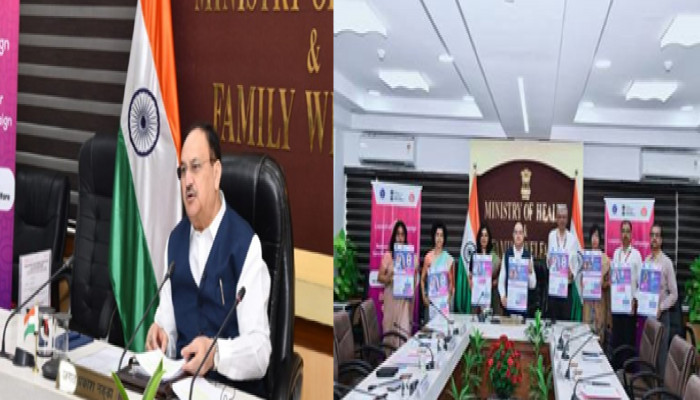JP Nadda launches National Zero Measles-Rubella Elimination campaign
- In Reports
- 01:51 PM, Apr 25, 2025
- Myind Staff
On Thursday, Union Minister of Health and Family Welfare, Jagat Prakash Nadda, launched the National Zero Measles-Rubella Elimination campaign 2025-26 virtually. This event took place on the first day of World Immunisation Week (April 24-30) and is an important step toward India’s goal of eliminating Measles and Rubella by 2026.
During the launch, the Union Health Minister introduced multilingual "M-R IEC materials," including posters, radio jingles, MR elimination materials, and the official "U-WIN launch film." These materials aim to raise awareness in communities about the campaign. They were also shared with all States/UTs to be adapted and used during the MR Elimination Campaign 2025-26. Speaking at the event, JP Nadda said that "today is a momentous occasion as the launch of the Measles-Rubella elimination campaign 2025-26 marks an opportunity to achieve 100 per cent immunisation coverage and provide high-quality lifestyles to children by administering them with the two doses of the Measles and Rubella vaccine." Union Health Minister Nadda highlighted that this disease is highly contagious, affecting not only children's lives but also causing significant distress to their parents. He emphasised the need to make sure that "not even a single child is left behind."
Nadda also praised the Ministry for receiving the prestigious "Measles and Rubella Champion Award" from the Measles and Rubella Partnership in 2024. He pointed out that "332 districts in the country have reported zero measles cases and 487 districts have reported zero rubella cases during January-March 2025," showing the progress made towards achieving the goal of "M-R elimination." Nadda also emphasised the importance of keeping the "IDSP" active and improving surveillance.
"We have to target the elimination of M-R in the same way as Polio and Maternal and Neonatal Tetanus elimination was achieved", he stated. He urged the states and UTs to be attentive, alert, and proactive and work with an 'ACT NOW' policy. Nadda also encouraged State Ministers and Chief Medical Officers to organise public and press meetings to inform the general public about the vaccination drive through active "Jan Bhagidari."
He asked the States to involve all MLAs, MPs, local leaders, and Panchayat heads in spreading awareness about the vaccination against Measles and Rubella. He further urged frontline workers to reach out to remote and hard-to-reach areas, slums, the migratory population, and places with frequent outbreaks. "We have to reach out to people in the last mile to ensure that we achieve 100 per cent coverage," he emphasised. He also highlighted the importance of coordinating with line ministries. "If we work and act from today, we will be able to achieve success tomorrow" , he added. Measles and Rubella are highly contagious viral diseases that can cause severe illness, long-term complications, and even death. Because these diseases spread easily, India aims to eliminate them by 2026.
As part of the Universal Immunisation Programme (UIP), two doses of the "Measles-Rubella (MR)" vaccine are given for free to all eligible children, at 9-12 months and 16-24 months of age. Currently, India's MR vaccination coverage is 93.7% for the first dose (2024-25 HMIS data) and 92.2% for the second dose. In 2024, India saw a significant 73% decrease in Measles cases and a 17% reduction in Rubella cases compared to 2023.
India was honoured with the "Measles and Rubella Champion Award" by the Measles and Rubella Partnership at the American Red Cross Headquarters in Washington, D.C., on March 6, 2024. This recognition highlights the country's outstanding efforts in preventing measles and rubella. India runs the world’s largest vaccination program under the "Universal Immunisation Programme" (UIP), which vaccinates 2.9 crore pregnant women and 2.6 crore newborns every year. This program protects against 12 vaccine-preventable diseases (VPDs), including Polio, Measles, Rubella, Diphtheria, Tetanus, Rotavirus diarrhoea, and Hepatitis B.
The "U-WIN" digital platform, launched by the Prime Minister, is widely used to record vaccination events, generate vaccination certificates, and book vaccination appointments across the country. The Universal Immunisation Programme has played a key role in reducing mortality rates and controlling infectious diseases in children under five. From 2014 to 2020, the under-5 mortality rate dropped from 45 to 32 per 1,000 live births (Source: Sample Registration System, 2020). Since 2014, over six new vaccines, including the "MR vaccine," have been introduced under the UIP.







Comments